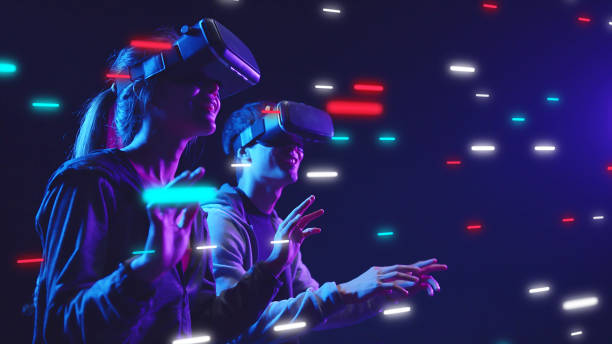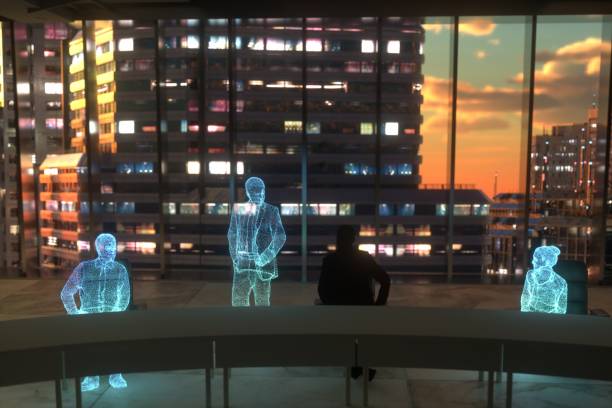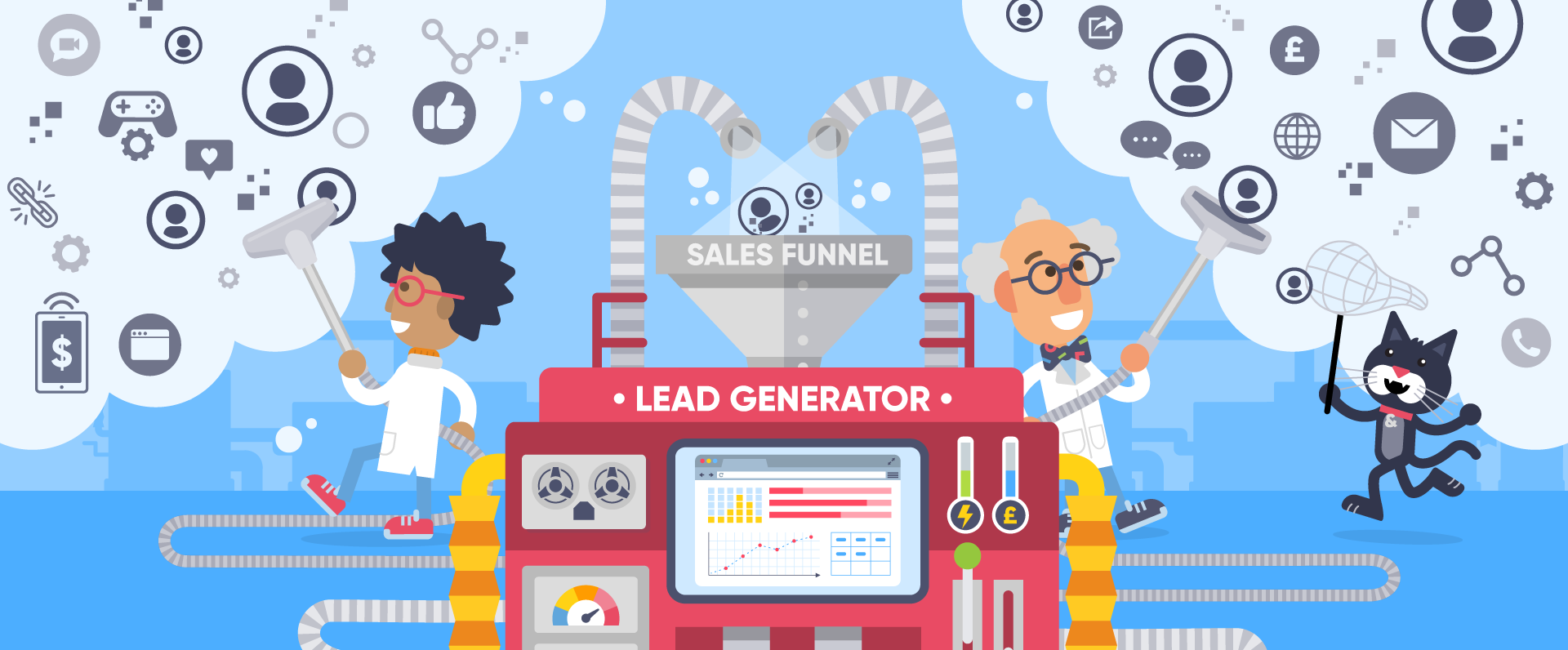We recommend memorizing great films about a parallel universe in which characters can exist simultaneously with actual existence in order to grasp what the metaverse is.
Before 2000, cult films like The Matrix by the Wachowski brothers and Tron by Steven Lisberger came to mind. However, the word was invented by author Neil Stevenson, who penned the novel Avalanche in 1992, which described something similar to what we see in The Matrix.
The core of films and books is simple: a person is immersed in virtual reality (VR) with the assistance of special gadgets, where he interacts with other immersed individuals and performs almost all of the actions that are possible in real life.
The present notion of the metaverse has some similarities to virtual reality, but they are not the same. The Metaverse is a virtual reality environment that allows you to:
- It runs continuously, never turning off;
- it employs a variety of technologies that immerse us in the digital world; and
- it generates independent laws and economies inside itself, thus making it a single state.
It sounds significant, and it’s not difficult to think that progress in this direction is being made now. However, keep in mind that the invention of touch displays was previously considered science fiction.
In the popular computer game Minecraft, which is actually a form of parallel reality, you may start designing your own universe. The game’s popularity is amazing; official data show that the project has 5.3 million players.
What inspired the concept of the Metaverse?
We’ve previously explained where the notion of creating a unified virtual world first surfaced, but it was the creation of imaginative individuals who predicted the arrival of a dystopia based on universal computer enthusiasm.
Mark Zuckerberg, the founder of the popular social network Facebook, announced the launch of the worldwide Meta project in 2021, which would establish a parallel digital reality. And it will be able to exist there as fully as in the movie and book stated above.
The key characteristics of the new reality are that each individual will have his or her own avatar (another well-known film comes to mind), and internal processes will be represented as 3D and 4D holograms. Those that immerse themselves in the “meta” will have their own house and even a workplace, allowing them to live a normal life inside the new universe’s structure.
The project is genuinely global: more than 10,000 firm personnel are now working on its development, and investments have surpassed $10 billion, with the amount expected to rise.
People in the Meta world are not obliged to register in specific social networks, unlike conventional Internet communication platforms.
Users of the popular social media platform Instagram, as well as many other supporting programs, must be registered with the social media platform Facebook. The developers say that a person’s individuality will be more closely linked to the universe than his Facebook profile.
What goes on behind the scenes
The business is already working on technologies that will allow you to fully immerse yourself in the Metaverse. As a result, Meta should develop customized headphones by 2022 that will nearly complement current reality.
It will be feasible to combine reality and digital life in the physical realm. For example, the headgear will be able to analyze facial expressions and estimate mood, as well as track eye movement and create augmented reality right before your eyes.
Special augmented reality glasses, similar to a headset, are also being developed to integrate new digital aspects into everyday life. Google had already developed such spectacles a few years ago, but they were not well received by users.
Virtual reality glasses are now available in two styles at typical electronics stores, making them accessible to the general public.
- The first, which comes in the guise of regular sunglasses, is more likely to double as a Bluetooth headset.
- The second is a working prototype of VR immersion: these are computer gaming glasses that make you feel like you’re a genuine participant in the digital process. It is proposed to construct special glasses to enhance reality based on the latter.

Let us try to envision how the system will function.
In the Meta world, you design your avatar by giving it particular physical characteristics. By the way, it’s unclear if an avatar will be able to alter appearance at a whim or if it will be a complete digital clone of a real person with all of their physical characteristics.
Tools for immersion will be available, including glasses, a special headset, maybe game joysticks, and other technical equipment.
You’ll go to work in the metaverse on a “virtual morning,” where you’ll have a meeting to discuss the production of a new clothing collection for the designer you work for.
Your coworkers’ avatars will be close by, yet you are in Moscow, designer Maria is in Krasnodar, PR manager Andrey is in Belarus, and the company’s owner spends the winter in Thailand. However, you all decide on the direction of the spring-summer collection and divide your tasks in one virtual room.
You and Andrei (recall that he is geographically based in Belarus) go for a virtual park stroll for lunch, during which a coworker laments that he is having difficulty developing a virtual home since the cost of digital designers has risen.
You meet with your young guy, who is literally located in another Moscow neighborhood, at the end of the virtual working day. Although traffic delays are not as bad as they will be in 2022 since many people have moved to remote work in virtual reality, it is still inconvenient to lose time on the road. As a result, you embark on a virtual walk together, peering into a new virtual theatre where you may attend the premiere of a new Fast and Furious film with other “avatars.”
You recall that you didn’t buy an evening dress for tomorrow’s celebration on your way to your virtual home: your buddy is getting married, and the ceremony is taking place in the metaverse. You go into a virtual clothes store, try on a few outfits for your avatar, and then purchase the one you choose. It’s now visible in your virtual reality closet.
Concerning payment, by the way. Most likely, cryptocurrency or “crypto” will be used, but it is more probable that a unique payment system and virtual currency will be developed that can only be earned and spent in VR. And, like actual banknotes, it may be represented in the form of tokens – NFTs – digital monetary units with their own unique number.
You may exchange digitally purchased things with other Sims or give digital objects as gifts for the holidays in the Metaverse.
What is the purpose of a metaverse?
And, in a related vein, why do we need a metaverse? Let’s see if we can figure things out.
First and foremost, to Meta’s developers. When we transfer operational tasks – the “OS” – into virtual reality, it is apparent that the proprietors of the digital world will benefit the most.
Globalization would inevitably lead us to immerse ourselves in a digital environment, therefore Mark Zuckerberg only hastened the process in order to get a competitive advantage. Such is the physical truth of our life and its use in speeding up progress.
Remember that Elon Musk formerly dominated the niche of private spacecraft manufacture, becoming a monopolist in the industry.
The Metaverse, on the other hand, will be beneficial to us. But why is that?

Unrestricted Communication
We will have the possibility to speak with people who are thousands of kilometers away. This will not only help us to make new friends and meet fascinating people, but it will also allow us to stay in touch with loved ones and relatives who live far away and with whom we may not be able to meet frequently.
In fact, the metaverse will fundamentally alter both the notion and actuality of communication.
The procedure for working
The way people communicate is changing, and the way people work is changing as well. Many organizations may no longer need to build a separate office for employees, complete with workspaces and leisure facilities, as a result of the introduction of a single digital environment.
A significant portion of the work will be done in virtual reality, particularly when meetings transition from the video format used by Zoom and Microsoft Teams to the digital presence of avatars in a single area. Both the product’s exposure, as well as shared brainstorming and the prospect of a live discussion of concerns, will be available here.
In the event of a pandemic, security is paramount
The epidemic and the fast morphing virus trapped us within the four walls of our home and forced us to work in a digital format. Our editors work remotely for you, meeting only once a week to discuss the process and the work’s direction.
All new strains, as well as the genuine risk of death that the coronavirus infection poses, drive us to seek out ways to communicate with clients and employers through the Internet.
No one knows how long the worldwide standstill will last: home experts predict a year of caution, while international physicians warn of years of caution. In any case, the Meta universe will assist us in feeling as liberated as possible in the event of a global epidemic.
At-a-distance services and education
We will be able to acquire the greatest education online without having to leave our homes thanks to virtual reality. For example, by paying tuition and passing tests, you may become a student, sitting in the classroom, not literally, but as an avatar of yourself, listening to the teacher’s instruction.
Distance education is now the template for what has been outlined, but actual tasks must be completed offline. Consider how many possibilities for skill practice are provided to medical students who initially practice manipulating objects in the metaverse before moving on to working with a real human body.
If a first-class specialist is an active metaverse user, he will be able to offer to advice and examination. This will save individuals time and money by reducing the amount of time and money they spend on transportation, waiting in lines, and so on.
What is the best way to make money in the metaverse?
Despite the fact that a significant portion of the business has already been transferred to the Internet, a significant amount of money is spinning online, and the system is still evolving, we recognize that the metaverse is not simply a transfer of reality in which our familiar currency will take on an electronic appearance, but also a new world with its own separate currency, such as “crypto.”
Because practically all sorts of companies, with the exception of catering, practical medicine, and a small number of other fields of activity, may be moved to the online format, the commercial development of such a world will be similar to that of the physical format. Almost certainly, there will be new areas of earnings within the digital system.
This is, first and foremost, product development for Metaverse, in which a programmer may only create programs and goods for the new universe. Using them will be compensated, and the creator will be able to benefit handsomely if the system is approached correctly.
Offline businesses will be able to promote their items in the metaverse and sell them in the digital realm, with physical delivery.
For example, you may go to a digital supermarket, pick out a basket of things, pay for them at the checkout, and anticipate a courier to be collecting your order and delivering it to you soon someplace in the physical portion your world.
Similar to well-known delivery services, however here you can see and “touch” the product, whereas today you can only pick what you need from a gallery of images on your smartphone screen. Of course, this will necessitate huge investments, but the returns should be substantial.













![How to Fix [pii_email_e7ab94772079efbbcb25] Error Code? [pii_email_e7ab94772079efbbcb25]](https://www.techwebtopic.com/wp-content/uploads/2022/02/istockphoto-898443430-612x612-4.jpg)


